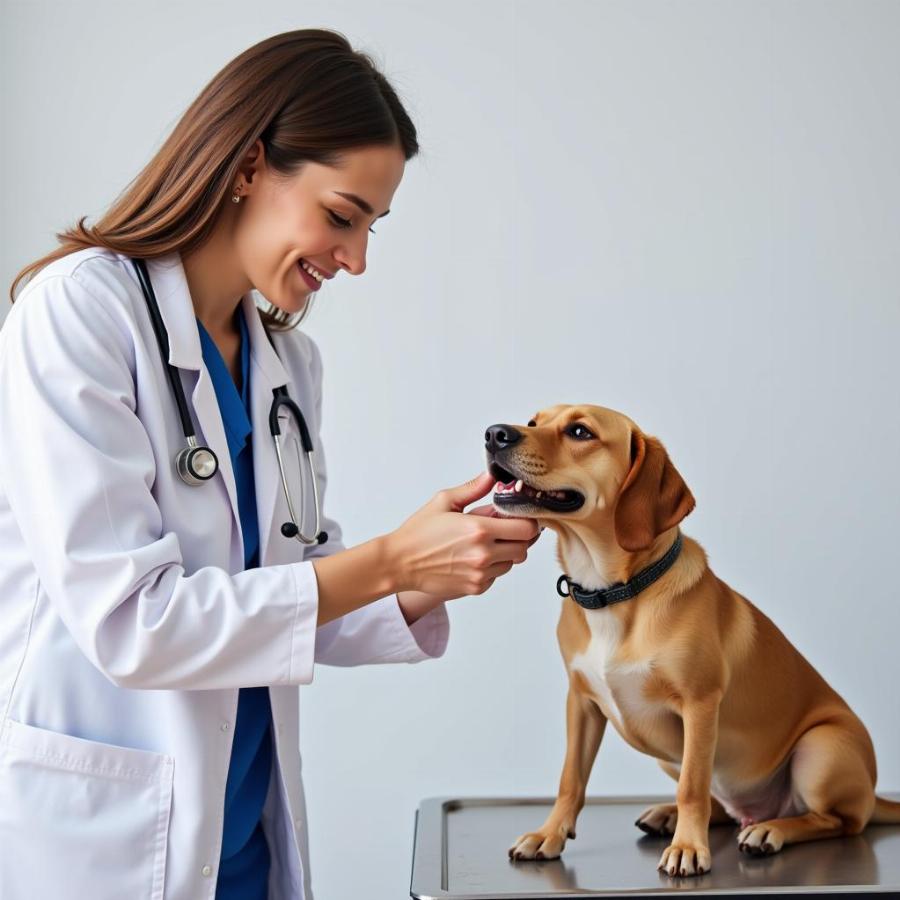We’ve all seen our canine companions swiftly lick their lips, but have you ever stopped to wonder what this simple gesture truly means? While it can be easy to assume a lip lick is just a dog’s way of savoring a delicious treat, the truth is, it can communicate a range of emotions and physical states. Let’s delve into the fascinating world of dog body language and uncover the secrets behind those subtle lip licks.
Decoding Dog Licks: More Than Meets the Eye
Dogs primarily communicate through body language, and like any good conversation, it’s a two-way street. Understanding your furry friend’s subtle cues can strengthen your bond and help you provide the best possible care. While tail wags and playful bows are easily recognizable signs of happiness, lip licking often carries a more nuanced message.
Common Reasons Why Dogs Lick Their Lips
Here are some common reasons why your dog might be engaging in lip licking:
-
Anticipation: Just like us, dogs salivate when they smell something delicious. If you’re preparing their meal or offering a treat, a few anticipatory licks are perfectly normal.
-
Stress or Anxiety: Lip licking can be a subtle sign of stress or anxiety in dogs. Pay attention to the context. Is your dog in a new environment, surrounded by unfamiliar people or animals, or experiencing a change in routine?
-
Fear or Appeasement: When dogs feel threatened or intimidated, they may lick their lips as a way of appeasing the perceived threat. This behavior is often accompanied by other calming signals, such as yawning, averting their gaze, or tucking their tail.
-
Nausea or Discomfort: If your dog is experiencing nausea, stomach upset, or feeling unwell, they may lick their lips excessively. This can also be accompanied by drooling, loss of appetite, or vomiting.
-
Medical Conditions: In some cases, excessive lip licking can be a sign of an underlying medical condition, such as dental disease, allergies, or gastrointestinal issues.
Recognizing the Signs: Is Your Dog Stressed?
dog licking lips meaning can be subtle, and it’s important to consider the context and look for other accompanying body language signals.
Signs a Dog is Uncomfortable:
- Whale eye: When a dog shows the whites of their eyes (sclera), it can be a sign of stress or anxiety.
- Yawning when not tired: Yawning can be a displacement behavior, indicating stress or anxiety.
- Excessive panting: Panting when not hot or after exercise can also be a sign of stress.
- Tail tucked between legs: A tucked tail is a classic sign of fear or anxiety.
signs a dog is uncomfortable with a child can be similar and it’s crucial to supervise interactions between children and dogs closely.
What to Do If Your Dog Won’t Stop Licking Their Lips
dog won't stop licking lips can be a cause for concern. If your dog’s lip licking seems excessive or out of character, or if it’s accompanied by other worrisome symptoms, it’s essential to consult with your veterinarian.
“Excessive lip licking can be a sign of an underlying medical or behavioral issue,” says Dr. Emily Parker, a certified veterinary behaviorist. “It’s crucial to rule out any medical causes first and then address any potential behavioral concerns with the help of a qualified professional.”
 Veterinarian Examining Dog
Veterinarian Examining Dog
Creating a Safe and Comfortable Environment
Providing a safe and enriching environment for your dog can go a long way in reducing stress and anxiety:
- Safe Space: Ensure your dog has a designated safe space where they can retreat to when feeling overwhelmed.
- Routine: Dogs thrive on routine. Maintaining consistent feeding, walking, and playtime schedules can help reduce anxiety.
- Positive Reinforcement: Use positive reinforcement training methods to build confidence and trust.
- Enrichment: Provide plenty of mental and physical stimulation through interactive toys, puzzle feeders, and regular exercise.
Understanding Your Dog’s Language
By learning to interpret your dog’s subtle body language cues, like lip licking, you can strengthen your bond and ensure they live a happy and fulfilling life. Remember, every dog is unique, and what might be a sign of stress for one dog might be perfectly normal for another. Paying close attention to your furry friend’s overall behavior and consulting with your veterinarian when needed are key to responsible dog ownership.
FAQ: Common Questions about Dog Lip Licking
Q: My dog licks their lips a lot after eating. Is that normal?
A: Yes, it’s perfectly normal for dogs to lick their lips after a meal to clean their chops and savor any lingering flavors.
Q: How can I tell the difference between a happy lip lick and a stressed lip lick?
A: Context is key. A happy lip lick is often accompanied by relaxed body language, while a stressed lip lick might involve other signs of anxiety, like whale eye or a tucked tail.
Q: What should I do if my dog is constantly licking their lips?
A: Consult with your veterinarian to rule out any underlying medical conditions. If medical causes are ruled out, seek guidance from a certified veterinary behaviorist.
Looking for more insights into your furry friend’s behavior?
Check out these related articles:
Beaut Dogs: Your Trusted Source for All Things Canine
Beaut Dogs is dedicated to providing dog lovers with reliable, insightful, and engaging content to help you understand and care for your canine companions. From breed-specific information to expert advice on nutrition, training, and well-being, we’re here to guide you on your journey as a dog owner.
For personalized guidance and answers to your specific dog-related questions, don’t hesitate to reach out to our team at [email protected].